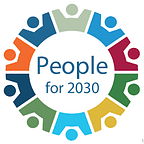Amplifying the voice of people with disabilities in Vietnam
Meet Dao Thu Huong, a Disability Rights Officer for UNDP/UNV Talent Programme for Young Professionals with Disabilities in Vietnam, who shares how her job allows her to empower persons with disabilities nationwide and promote disability inclusion within and outside the UN system.
As Disability Rights Officer, I am currently in charge of disability-targeted projects at UNDP. I’m supporting the accession of Viet Nam to the Marrakesh Treaty, to protect the rights of information access for persons with print disabilities. I am also supporting the revision of our country’s law on persons with disabilities, 10 years after its implementation. We are requesting revisions to ensure the law is aligned with the Convention on the Rights of Persons with Disabilities. Another meaningful project is building up capacity for organizations of persons with disabilities to monitor the CRPD implementation in Viet Nam, using human rights monitoring tools. This is our first step to establish an independent monitoring mechanism on the rights of persons with disabilities in Viet Nam.
Before working for UNDP, I supported a small-scale project for students with visual impairments. From the job description on the UNDP website for the “Disability Rights Officer”, I knew I’d be able to support even more persons with disabilities. Also, with UNDP, I knew I would contribute to the implementation of the 17 SDGs.
Dignified work for people with disabilities
In 2020, we engaged in a project to support people with disabilities during COVID-19, especially in the health and employment sectors. We conducted a rapid assessment of the socioeconomic impacts of COVID-19 on persons with disabilities. In the health sector, we provided some disability inclusion training, as well as rehabilitation equipment for a medical centre in a rural area so that it can become a role model in providing health care services for people with disabilities. In the employment sector, this project provided people with disabilities with digital skills so that they can adapt to their new work environments after COVID-19. They can apply for home-based or online employment, especially when the physical environment is not entirely accessible for people with disabilities, particularly with social distancing measures.
We also promote the employment of persons with disabilities by connecting people with disabilities with employers and improving employment policies. We are very happy to see more and more people with disabilities trained in the digital work environment. We are working particularly to empower persons with disabilities in the field of innovation. Using the indicators that we have developed to measure our success, we can see the increased income of persons with disabilities after our project. More importantly, we can see their smiles and their happiness now that they can live independently and with dignity. In addition, we can see that our recommendations are taken into consideration by the government. Those are sweet fruits resulting from our attentive listening to the voice of PWDs, and our hard work of facilitating policy dialogues between policymakers and persons with disabilities.
Another project that I was working on is the UN Disability Inclusion Strategy. This is the strategy to improve the disability inclusion of our UN system. This strategy includes conducting interventions with regards to leadership, organizational culture, accessibility, consultation with people with disabilities, among other things, so that we, the UN, can walk the talk of leaving no one behind. The implementation of this strategy is very important, so we are using a scorecard to monitor it.
Establishing disability-inclusive SDGs
I like working at UNDP for a few reasons. I feel this is an environment where everyone’s rights are respected and our contributions are appreciated. This is also an environment of diversity. We are from different backgrounds: We have different religions, we are from different ethnic groups, different sexual orientations, with or without disabilities, different countries and cultures. We can learn from each other.
As someone from a vulnerable group with special needs in terms of accessibility, I’m supported at UNDP with accessible facilities for my work so that I do my best to contribute to the ultimate goal of the organization. I hope that in the future I can engage more people with disabilities in our UN work. I think that many people with disabilities sometimes lack the confidence to apply for a position at UNDP. During my work, I already opened some opportunities for people with disabilities to apply for UN jobs, and recently, a candidate with a physical disability was successfully recruited as our UN Country Team Disability Inclusion Focal Point. This is a key step in implementing the Disability Inclusion Strategy and gradually establishing the Disability Inclusion Coordination Mechanism in the UN in Viet Nam. Without persons with disabilities, the disability-inclusive SDGs cannot be achieved.
